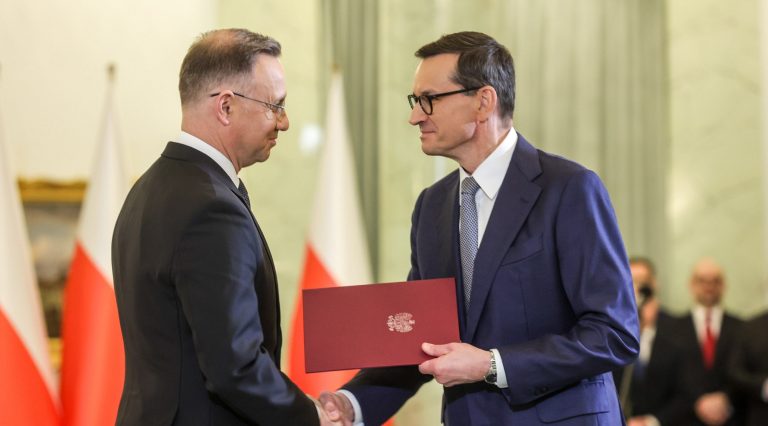Polish diaspora hopes its overseas votes can swing Poland’s close-run election

By Katarzyna Skiba
Almost 400,000 Poles abroad have registered to vote in this Sunday’s elections – a number equivalent to the population of Poland’s seventh-largest city, Szczecin. In a close race, many in the Polish diaspora hope that their votes could be crucial to the outcome.
Paweł Ferguson, 29, was born in a small town outside of Gdańsk and in 2016 moved to Scotland, where he now lives with his husband. Even years after leaving, Ferguson feels “huge ties to the beautiful Polish culture and history”, and has also been very active in Polish politics from abroad.
Aside from participating in elections, he also organised a “Polish Stonewall” march in Scotland for LGBT rights as well as “Women’s Strike” protests as part of mass demonstrations against a near-total ban on abortion in Poland. Though Ferguson has no plans to move back, he will continue to vote in Polish elections.
“I don’t see any other option but to participate”, says Ferguson, who will be voting for The Left (Lewica), an opposition group. “I think first and foremost about my family and friends who live there every day. I want them to live in an open, safe and European country. I am voting for them”.
A large opposition march has passed through Warsaw, two weeks ahead of parliamentary elections.
„We are moving towards a Poland that is open, tolerant, European,” declared the city’s opposition mayor @trzaskowski_ https://t.co/2hUP3a8YXY
— Notes from Poland 🇵🇱 (@notesfrompoland) October 1, 2023
Ferguson is not alone. By Friday last week, over 350,000 Polish citizens had registered to vote abroad and by this morning the number had risen to 380,000. That figure is already a record, and is expected to increase further by the registration deadline tomorrow.
Anyone with Polish citizenship, regardless of whether they have ever lived in Poland, has the right to vote, in contrast to some other European countries.
The UK only allows expatriates to vote for fifteen years after they have left the country. Germany requires its nationals abroad to have lived in Germany for at least three months in the last 25 years and to “have a close personal and direct relationship with German politics” if they wish to vote.
A record 350,000 Poles have registered to vote abroad in next week’s elections. The figure will rise further ahead of Tuesday’s registration deadline.
The surge in interest has led to concerns that some overseas polling stations will be overwhelmed https://t.co/eFeWTVZrYm
— Notes from Poland 🇵🇱 (@notesfrompoland) October 7, 2023
The influence of history
Part of the reason for this is history, with the Polish diaspora having played a significant role in the “development and the maintenance of Polish identity and Polish culture”, according to Aleks Szczerbiak, a professor of politics at the University of Sussex.
“There were periods when Poland was wiped off the map of Europe as a state, so the idea of Poles being ‘stateless’ citizens not formal citizens is quite deeply embedded in Polish national culture,” he says, adding that historically, the emigre community also contained centres of intellectual and political life.
Poland’s entry to the European Union in 2004 also led to a renewed wave of mass emigration to western Europe. Figures from 2021 suggest there are almost 700,000 Polish nationals in the UK and almost 900,000 with Polish citizenship in Germany.
This year, Poland’s foreign ministry has set up a record 417 electoral districts abroad at which Poles can vote this Sunday, 30% more than in the last parliamentary elections four years ago.
Two opposition candidates have asked the electoral commission to extend the 24-hour deadline for overseas polling stations to submit voting results.
They fear that, with a record number of Poles voting abroad, some polling stations will be overwhelmed https://t.co/x2HME1iOyg
— Notes from Poland 🇵🇱 (@notesfrompoland) October 9, 2023
In western Europe, the Polish diaspora tends to vote for parties currently in opposition. For example, in 2019, the main opposition group, Civic Coalition (KO), received 43% of the vote among Poles in Germany while the ruling Law and Justice (PiS) party got 24%. In the UK, KO got 37% and PiS 20%.
However, in the United States – which has a Polish population mainly rooted in earlier waves of immigration – PiS tends to be more popular: it won 53% of votes there in 2019 ahead of KO on 28%
“People that emigrated during or around the communist era in Poland, they’re going to vote for PiS”, says Stanisław Dziadkowiec, who has been living in Chicago – the US city with the largest Polish population – for the past 38 years.
He supports the ruling party, agreeing with its strong stance on migration and its decision to begin reinvesting in the military.
Poland’s president and PM have condemned the EU’s migration pact, which was approved by member states yesterday.
„Why should we agree to this diktat from Brussels and Berlin?” asked @MorawieckiM, who pledged to defend „Polish borders and sovereignty” https://t.co/Cb2JKtaFis
— Notes from Poland 🇵🇱 (@notesfrompoland) October 5, 2023
Though he has spent most of his life in the US, Dziadkowiec has voted in the Polish elections multiple times from abroad and he takes a strong interest in Polish politics. He and his wife own land in Poland and have considered moving back.
“We can build a house and live there”, he says, adding that “the United States is changing dramatically”, prompting him to consider the move.
Though sympathy for PiS is common among Polish Americans, opposition to the ruling party is also not hard to find and was recently on display during the annual Pulaski Day Parade in New York City on 1 October.
President Andrzej Duda, a PiS ally, became the first sitting Polish president to take part in the event. While he received a warn reception from organisers and many participants, he also faced protesters chanting slogans in Polish, including “democracy” “freedom”, and “free Poland”.
Andrzej Duda has become Poland’s first sitting president to take part in the Pulaski Day Parade in New York.
He thanked the Polish diaspora for supporting their ancestral homeland but also faced a protest from one group of Polish Americans https://t.co/fo8s0Op590
— Notes from Poland 🇵🇱 (@notesfrompoland) October 1, 2023
Fragmented participation
Yet while hundreds of thousands of Poles abroad remain politically engaged, the majority of the Polish diaspora – including many who were born in Poland – do not vote in Polish elections, even if they continue to be active in the Polish community culturally and socially.
“Since I live far from my homeland, I should not take any decision for those whose daily life takes place in Poland,” says Dorota Gregorzewicz, who teaches at a Polish language school in a suburb of Chicago.
“They are the ones who are aware of the issues the country is facing, so let them choose the people who they believe deserve trust and should hold political positions”.
Sunday’s elections are above all a clash between two parties, PiS and PO, that have ruled Poland for the last 18 years
We have prepared 21 charts showing Poland’s economic, social and democratic progress over that time.
Click here to see them all 👇https://t.co/rA5nIT8pv7
— Notes from Poland 🇵🇱 (@notesfrompoland) October 9, 2023
However, others feel that, even living abroad, they have a duty to vote in order to preserve the country’s values.
Małgorzata, a 64-year-old retired economist who did not want her surname published, was born in Warsaw and moved abroad when she was 25 years old. She frequently travels to Poland and actively “observes the changes taking place”, though up until very recently did not vote in Polish elections.
In the decades after she first left, “Poland developed very positively economically and democratically, where every citizen of the country did not have to be afraid of hate from the government, everyone could follow their own religion”, and “women had full rights”, she says.
But once the PiS government came to power, Małgorzata believes that the situation began to change and that “Poland began to regress”. Indeed, it has made her “start to remember the country I left”, she says, referring to communist Poland of the 1980s. It was at that point that she began voting, concerned for the country’s future.
Democracy has declined in Poland for the eighth year running to reach its lowest recorded level, according to the latest annual ranking by @freedomhouse https://t.co/BUZF0ebgMc
— Notes from Poland 🇵🇱 (@notesfrompoland) April 20, 2022
How much impact will the diaspora vote have?
In parliamentary elections, votes from abroad are cast for the Warsaw constituency, rather than for the specific cities where diaspora voters may have once lived or where they currently own property.
At the 2019 parliamentary elections, among voters abroad as a whole, 39% voted for KO and 25% for PiS. Given that this year’s race is looking like a close battle for a majority between PiS and a potential KO-led opposition coalition, some overseas voters believe their role could be crucial.
One organisation, Polonia Głosuje (meaning “the Polish diaspora votes”), has since 2019 been seeking to encourage Polish citizens abroad to participate in elections, providing information on how and where to register to vote from abroad.
“I think our lives are very closely tied to Poland, even for people who aren’t often political and who believe that the diaspora shouldn’t vote,” says Magdalena Oldziejewska, 36, an activist and academic who works for the organisation.
“Many of us go back to Poland very often, we have family there, and it’s important to us that they feel safe, that they are comfortable, and that they are living well”.
New electoral rules require counts of overseas votes to be submitted up to 24 hours after polls close, a deadline that does not apply in Poland itself.
The human rights commissioner says that this is unconstitutional and may disenfranchise some voters https://t.co/Zy7mzaiTo8
— Notes from Poland 🇵🇱 (@notesfrompoland) April 19, 2023
But Szczerbiak, the politics professor, is sceptical as to the influence such voters can have. Overseas votes “have no impact numerically on the national outcome”, he says.
In his view, the symbolic role of the Polish diaspora in politics is more about reassuring Poles who stayed in Poland that they are keeping the interests of their family or friends who moved abroad in mind, rather than seeking a significant number of diaspora votes.
“Polish political parties want to be seen to be taking an interest in Polish communities abroad,” says Szczerbiak, adding that Poles who have family or friends abroad want to know that the government is listening to them.
In the current campaign, the Polish opposition has proposed to create a new office specifically aimed at overseeing the interests of the Polish diaspora, including voting rights, access to Polish-language schools, and recognition of professional qualifications.
Poland’s main opposition wants to create a new state office to represent the interests of the Polish diaspora.
There are an estimated 20 million people of Polish ancestry outside Poland, equivalent to around half the population of the country itself https://t.co/WTZ8fCpept
— Notes from Poland 🇵🇱 (@notesfrompoland) September 19, 2023
And it is the opposition who appear best placed to benefit from the surging interest in voting from Poles abroad, among whom opposition to PiS is regularly expressed as a motivating factor.
“This year, I am uniquely motivated to vote,” says Marzena Powała, a 43-year-old lawyer originally from Olsztyn and now living in Chicago. “I feel betrayed by the government and surprised by its violations of the constitution”.
Notes from Poland is run by a small editorial team and published by an independent, non-profit foundation that is funded through donations from our readers. We cannot do what we do without your support.
Main image credit: Jakub Szymczuk/KPRP

Katarzyna Skiba is a freelance journalist and translator, currently studying for a master’s degree in journalism and international affairs at Sciences Po Paris.






